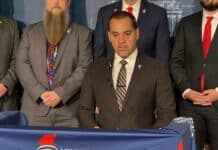![Phyllis_Kahn_(7926901212) By Michael Hicks from Saint Paul, MN, USA (img_5569) [CC BY 2.0 (https://creativecommons.org/licenses/by/2.0)], via Wikimedia Commons](https://alphanews.org/wp-content/uploads/2016/06/Phyllis_Kahn_7926901212.jpg)
When Representative Phyllis Kahn was challenged by Somali-American Mohamud Noor in the DFL primary for House District 60B in 2014, the district saw dramatic increases in voter turnout. This election year, the competitive three-way race in the district makes a repeat of high voter turnout very likely.
Kahn, who has served in the Minnesota House of Representatives for 21 terms, won the 2014 primary with 54% of the vote. Kahn pointed to the Somali community’s opportunity to elect the first Somali-American legislator as a driving force behind the high turnout two years ago, and predicted it would occur again. This year, Kahn faces two Somali-American opponents, with Noor returning and a new challenger, Ilhan Omar. Omar nearly won the DFL endorsement at the party’s convention in April.
“As everyone says, two opponents are better than one,” Kahn said. “The young woman (Ilhan Omar) has done a very good job of mobilizing students to get out to the caucuses and she’s also very attractive to the kind of, what we call the young, liberal, white guilt-trip people.”
In 2014, Precincts 2 and 3 in Ward 6 saw enormously higher rates of same day registration and absentee or early voting than any other precinct according to data from the Minnesota Secretary of State’s Office. The high levels of same day registration and absentee voting resulted in the two precincts having the highest total estimated voters of any precincts in the county according to the Secretary of State’s data, and they were focused on one race and one race only: the DFL primary for House District 60B. The 2nd and 3rd precincts of Ward 6 include parts of the Cedar-Riverside neighborhood, which is home to one of the largest Somali communities in the United States.
“The absentee was probably due to early voting, not really mailing in an absentee ballot,” Kahn said.
In Precinct 2, 115 voters registered on Election Day, and 411 voted early or by absentee ballot, rates that were 10 and 19 times higher respectively than precinct averages in Hennepin County as a whole. Precinct 3’s rates were even more disproportionate, with 294 same-day registries and 994 early or absentee voters, which were respectively 25 and nearly 46 times higher than the county-wide average rates.
According to the Secretary of State’s website, out of 1,280 total voters, 98 percent voted in the 60B primaries compared to only 28 percent voting in the gubernatorial primaries in Precinct 3. Similarly, 98 percent voted in the 60B primaries, while only 52 percent voted in the gubernatorial races in Precinct 2.
“It’s likely that voter outreach by supporters of both candidates drove the increased turnout, absentees and election day registrations,” Ryan Furlong, the Secretary of State’s Communications Director said. “Many of the supporters likely only had an interest in the 60B race and didn’t vote in the other races on the ballot for the primary.”
Kahn predicts that the race will become even more intense this year with the two Somali candidates battling it out. Meanwhile, Kahn herself has decided to focus on her record representing the district and emphasizing her seniority in the legislature.
“I just talk about my record and what I can continue to do and the issues I’ve worked on,” Kahn said.
Mohamud Noor’s campaign did not respond to requests for comment in time for publication.




